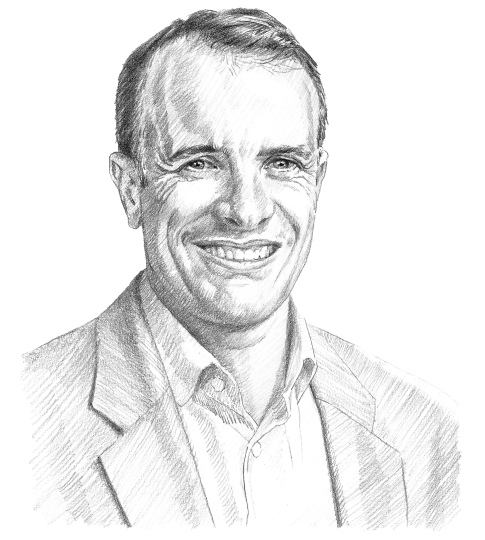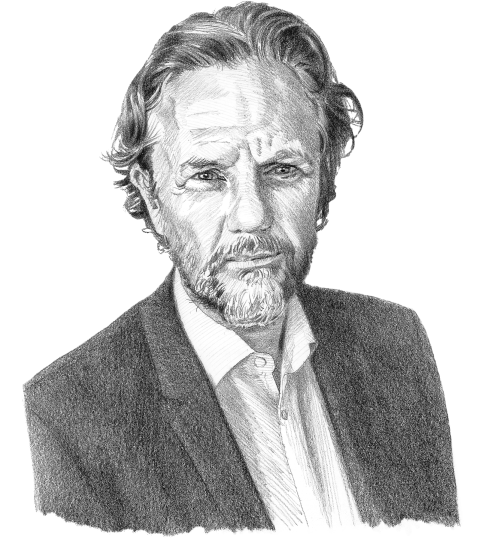The paradoxes of the EU’s Africa policy
The European Union has placed huge bets on an investment program in Africa. Yet inherent flaws in its technocratic approach and a lingering paternalism threaten the whole scheme.

In a nutshell
- The EU sees digital and green investments as a way to curb China’s rise in Africa
- Aid goals are being undone by EU regulations and poor program design
- Behind these flaws is a paternalism not so distant from French policy in the 1960s
European Union officials are regularly traveling to Africa with new development programs and offers of “equal partnership” and “green development,” while admitting they have self-serving interests to pursue with their neighbors to the south. The world is not what it used to be, however, and one element of its new geopolitical configuration is fierce competition for Africa. Above all, this contest pits Europe against China, though it involves other global powers like the United States, Russia and India, along with regional players such as Turkey and Brazil. The question is whether Europe, as Africa’s primary historical partner (and former colonizer), has any prospect of winning this confrontation. There is room for doubt. For all its claims of a new paradigm, what the EU has on offer can still be seen as patronizing, or worse.
Global Gateway
In 2021, the EU launched Global Gateway, a 300 billion euro global program to support green transition and digital transformation (promoted by the bloc’s Green Deal climate strategy) through 2027. Half of that sum is earmarked for Africa. Global Gateway answered the EU’s traditional problem of selling complex programs within a broad umbrella package, bundling EU companies from various member countries in fast-tracked offers for African partners across a wide range of national and regional investments in green infrastructure, extractive industries, transport, energy and research.
Flagship projects include the construction of 7,100 kilometers of high-speed fiber optic networks connecting Africa and the EU, including submarine cables across the Mediterranean (Medusa) and to East Africa (Africa 1), plus a potential extension to Dakar in West Africa, along with backbone digital networks spanning sub-Saharan Africa. Another scheme would install 40 gigawatts of clean hydrogen production by 2030.
Countering China
From a geopolitical perspective, this massive investment program is a clear counter to China’s strategic encroachment through the Belt and Road Initiative (BRI). The BRI’s potential $900 billion in long-term investments has lured many African countries into the Chinese orbit. Trying to reverse this trend poses a serious challenge. At the United Nations, for example, the difficulty of promoting Western values and initiatives is shown by the stinging 2022 defeat of a UN Human Rights Council motion on Chinese repression of the Uighurs, with only one of 13 African countries voting in favor. Even the October 2022 UN resolution against Russia’s illegal annexations in Ukraine, which passed the General Assembly by a 143-5 vote, failed to win support from most African states, which either abstained or were absent.
The EU has taken pains to distinguish its investments from China’s. Firstly, European Commission President Ursula von der Leyen has been blunt about not using EU funds to leverage Chinese capital, saying “it makes no sense for the EU to build a road between a Chinese-owned copper mine and Chinese-owned port.” Secondly, the EU insists on assessing and monitoring the environmental and human rights impacts of its projects. Finally, the EU stresses its distinct funding model, which offers a mix of grants and low-interest loans instead of China’s “debt trap diplomacy.”
Gatekeepers
The EU’s involvement in Africa is also motivated by an urgent desire to curb migrant flows across the Sahara and Mediterranean, which are confronting Europe with serious integration and political challenges. Developing Africa would create jobs and reduce unemployment and poverty – a main cause of migration. The EU has thus calibrated its aid policies to incentivize African countries to control migration.
Fostering economic development in Africa would also serve to reduce political instability, which itself is a contributing factor to poverty and migration. However, in some places, foreign-sponsored development projects end up having the opposite effect, especially when they are seen as disrupting local rights or balances of power – through land grabs, pollution or stripping natural resources such as minerals, forests and fishing grounds. According to the EU’s logic, a greener agenda would make new investments more socially acceptable. It would also build political support for a closer security partnership with African states, helping secure EU investments and spurring a renewed fight against terrorism.
Back to business
One obvious European interest is access to African raw materials. As the EU intensifies its electricity-based ecological transition and “green” reindustrialization, its appetite is growing for inputs such as copper, nickel, lithium, cobalt and other rare earths essential to manufacturing solar panels, electric vehicles or smart grids. For a country like France, which generates almost two-thirds of its power from nuclear reactors, uranium supplies are essential – and 20 percent of France’s uranium imports over the past six years have come from Niger.
The EU remains Africa’s leading trade partner, absorbing 33 percent of its exports to non-African countries and accounting for 31 percent of its imports from non-African countries in 2020. But those shares have been declining, especially relative to China, which has increased its own slice of Africa’s exports and imports to 17 percent and 22 percent, respectively. European policymakers are keenly aware that a closer economic partnership with Africa would mean more EU sales to a high-growth market. A larger African market share for EU companies would also mean greater leverage on regulatory standards that can then spread globally, increasing the bloc’s “normative” power.
Green paradoxes
Coupled with the Green Deal, Europe is spreading the gospel of sustainability as a stratagem for “doing well by doing good.” The fit is not so neat, however, as many see the imposition of a green agenda on African development as a serious obstacle to industrialization-based growth for the continent. The new European Carbon Border Adjustment Mechanism (CBAM), a “green” carbon tax on imports launched in October 2023, might create adverse effects for African industrial exports to the EU, making them less competitive through complicated and costly red tape.

Last December, the president of the African Development Bank estimated that the CBAM could end up costing African governments as much as $25 billion per year. That seems a heavy price to pay for a latecomer to the development race, especially since Africa only contributes 3 percent of global greenhouse gas emissions and was among the first regions to feel negative climate change effects. The measure seems even more unfair because fossil fuels are one of Africa’s main exports to Europe, leaving the latter open to criticism for double standards. Europe’s hypocrisy may become even more glaring if its scramble for gas intensifies due to the cutoff of imports from Russia.
Regulate this
On the trade front, despite the EU Economic Partnership Agreement and the lifting of tariffs, many African businesses in the farm sector are hampered by non-tariff protectionism and European subsidies. This “hidden protectionism” serves to discredit the customary “win-win” narrative issuing from Brussels. It also bolsters claims that Europe is attempting to restore colonial or postcolonial economic relations with Africa, which has served many African politicians as a pretext for turning to competing powers like Russia or China.
More by Emmanuel Martin
- The anatomy of the EU’s farm policy crisis
- Sickly Germany and France pose a risk to the eurozone
- France torn between Morocco and Algeria
Recent European attempts at regulating supply chains have also had some paradoxical effects. The Corporate Due Diligence Directive, adopted by the European Parliament in April, indeed requires big EU and non-EU companies to exercise due diligence along their supply chains. Its likely effect will be to make supply chain sourcing and direct investment much more costly in many African states, where enforcement of human rights and environment protection is weak. For all its good intentions, the measure’s unintended consequence will be to encourage many companies that sell in the EU to divest from Africa.
Patronizing habits
While EU leaders keep talking about a “partnership of equals,” their stated intention of including local partners in projects is inherently patronizing. Africans have grown increasingly resentful of the paternalism of aid and institutional design produced by so-called experts in Washington or Brussels. Both issues concern the age-old knowledge problem (not to mention skewed incentives) of outsiders when they bypass local stakeholders.
Replying to French President Emmanuel Macron at a 2017 summit, Ghana’s President Nana Akufo-Addo had this to say:
We can no longer continue to make policy for ourselves – in our country, in our region, in our continent – on the basis of whatever support that the Western world or France or the European Union can give us. It has not worked, and it will not work.
In a similar context, President Felix Tshisekedi of the Democratic Republic of the Congo warned in March 2023:
It is precisely this that needs to change in our relations with France in particular, and with the West and Europe in general… Look at us differently by respecting us, by considering us as real partners, and not always with a paternalistic perspective of always thinking you know what we need.
Africa badly needs economic freedom to unleash its massive entrepreneurial potential. It is quite uncertain whether the EU’s development strategy, conceived in a typically technocratic fashion, focuses on this need, despite its good intentions.
Scenarios
Least likely: EU success
Super-efficient management of EU aid spurs “green” development on both sides of the Mediterranean and avoids many of the unintended consequences mentioned earlier. Realistically, no matter how much it is wished for, this is not a very plausible scenario.
Most likely: Status quo
Assuming the typical inertia of such programs, investments and aid will suffer from poor coordination due to knowledge issues and bad incentives (corruption etc.). Slow progress impedes EU efforts to counter China and secure its investment plans. Luckily, African development does not depend solely on the EU. This looks like the most probable scenario.
Likely: Strategic failure
Not the baseline scenario but a very close second. Here, the EU’s ambitious strategy comes to grief due to the unintended effects of its own regulations and plans. Meanwhile, as the new Cold War between the West and Russia/China heats up, Africa becomes a key theater in the conflict. Europe’s efforts lose momentum as anti-Western propaganda and Russian mercenary operations emerge as serious threats.
For industry-specific scenarios and bespoke geopolitical intelligence, contact us and we will provide you with more information about our advisory services.









